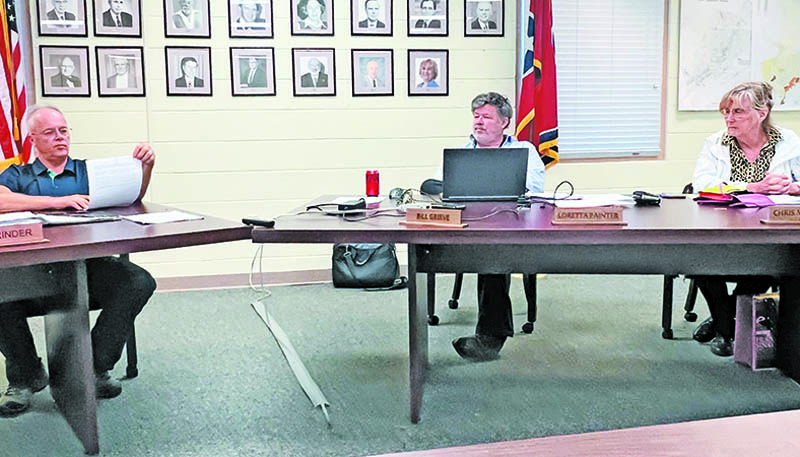Norris council makes move to limit short-term rental zones

Norris City Councilman Will Grinder, left; Mayor Chris Mitchell, center; and Council- woman Loretta Painter on Monday night all supported a change in the city’s zoning ordinance that would ban short-term holiday rentals in all of the city’s residen- tial zones. The three are shown here at a Norris Planning Commission meeting on Oct. 1. (photo:G. Chambers Williams III )
The council voted unanimously to direct the new city manager, who starts to work next Monday, to write a zoning ordinance to that effect.
This action came after the Norris Planning Commission voted last week to send its proposed zoning change to the council, which would have banned the short-term rental businesses in all residential zones except the so-called FAR zone (Forestry/Agriculture/Residential), which mainly encompasses Dairy Pond Road.
But when the council took up the issue Monday night, Mayor Chris Mitchell signaled that he would prefer to ban the holiday rentals from the FAR zone, as well. Other council members agreed, with Will Grinder and Loretta Painter specifically commenting that they also did not want the rentals to be allowed in the FAR zone.
Norris real estate broker Loy Johnson, who sits on the Planning Commission, and some Dairy Pond Road residents also spoke up at the meeting saying they would not want the rentals to be allowed in the FAR zone.
“I’ve always thought FAR should not be in it, so we don’t lose the sense of community that we have,” Johnson said.
Earlier this year, the city passed an ordinance allowing and regulating short-term rental businesses in the city, and as it stands now, they are allowed in all zones, including the original, historic residential areas that are in the R1 zone.
Council members signaled at the time that they wanted to ban the rentals in residential areas, but were told that would have to be done through a change in the city’s zoning and land-use plan. That’s what precipitated the current move to amend the zoning law to exclude the rentals from residential areas.
Because anyone could still get a permit to open a short-term rental property in any zone until the zoning law is amended, Mayor Chris Mitchell said Monday night, “I think there’s some urgency to this [zoning change].”
The council did not have a proposed ordinance in hand Monday to vote on, so Mitchell made a motion to direct the new city manager to draft an ordinance in time for a special called meeting of the council at 5:30 p.m. Wednesday, Oct. 26.
That ordinance ostensibly would be passed on first reading that night, and then be up for a public hearing and second reading at the council’s regular November meeting, which will be Nov. 14. The public hearing probably would be scheduled for the hour or half-hour before that meeting.
Adam Ledford will be the new city manager, replacing Scott Hackler, who resigned in June. A “meet and greet” for him will be held at 5:30 p.m. Tuesday, Oct. 25, at city hall.
The ordinance left out two provisions the City Council wanted to enforce for short-term rentals: one limiting them to specific zones; and another setting up a city sales tax for rental transactions.
Short-term rentals are defined by the ordinance as being overnight accommodations, other than hotel and bed-and-breakfast lodgings, of at least one night, but no longer than 30 nights.
Under the ordinance, owners of these properties have to pay $250 to apply for a city permit.
A separate ordinance has since been passed to levy the city sales tax on these rentals.
Even if the zoning changes are made, any short-term rentals already operating in the city will be allowed to continue.

